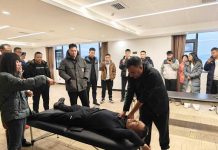BEIJING: What to do after exiting the athletic arena is a question many retired athletes ask themselves, including Chinese figure skating pair and two-time world champions Pang Qing and Tong Jian. Coaching is the usual go-to. But the partners-turned-couple are more ambitious: They want to turn retired figure skaters into performers and popularize the niche sport across China.
Pang and Tong are two of the most decorated figure skaters in the country: They won second place at Vancouver 2010, reigned as world champions in 2006 and 2010, and gained five titles at the Four Continents Figure Skating Championships.
Bread and butter
“We have been engaged in commercial skating since 2003,” Tong told Beijing Review. “As pros, we master the skating skills for both competing and performing. Our ice show has been pretty popular with international crowds.”
Performing ice shows across North America and Europe not only packed a nice financial punch, but also broadened the duo’s horizons. “We saw the market potential of turning skaters into performers and the sport itself into a product,” Tong said. Back then, China had no original ice shows.
After their farewell show at the 2015 World Figure Skating Championships in Shanghai, they got married and set up their own company, Beijing Yixiang Ice and Snow Culture Co. Ltd., that same year. Tong aimed to forge a framework under which retired figure skaters could transform into professional performers. “China’s ice show industry was budding. We had neither a standard nor an established model to follow,” he said. “I was at a loss.”
Tong enrolled in the Executive Master of Business Administration program at the Guanghua School of Management of Peking University in September 2015 to sharpen his management abilities.
At the same time, the couple established a club for retired figure skaters. “We offer professional training for retired skaters, to help them become artists and transform their skills into profitable business,” Tong said. “If we have only a passion for figure skating, but no bread, let alone butter, then we can’t survive.”
Wang Yi is one of the skater-turned-performers working on Pang and Tong’s team. He was a member of China’s national figure skating team. After his retirement, he joined Pang and Tong in 2016. “They have given me great support, coaching me and ensuring that I get in enough hours on the ice,” the 30-year-old told Beijing Review. Pang and Tong took Wang abroad for training and competition. “That enabled me to continue my dreams in the rink,” Wang said.
Winning over teenagers
Training young figure skaters features high on Pang and Tong’s agenda. Before 2015, very few private training centers in China offered courses in figure skating. The pair seized the opportunity and offered professional training for young enthusiasts. “Parents hope that a professional team like ours can help their children reach a higher level,” Tong explained.
In mid-June 2018, the duo’s own training base went into operation. It covers an area of some 7,400 square meters, including 2,400 square meters of ice rinks. It further features an indoor runway, a power training center, a dance hall and a rehearsal space. “It’s the largest single ice center in all of Asia,” Tong added.
Their team has trained more than 1,000 young devotees. “In the future, they are expected to take their place in the international arena and compete for medals on behalf of China,” Tong said.
Before the Olympic Winter Games Beijing 2022, Tong took on an urgent task: coaching candidate Olympians. To expand its athlete pool, the General Administration of Sport of China (GASC) launched extensive recruitment rounds in 2017 and 2018. Young people were recruited to undergo professional training. China organized three figure skating training teams, the red, blue and yellow crews, and top performers would be selected to the national youth team or the national team. The blue crew, with 47 members, was coached by Pang and Tong.
The pair’s hard work paid off. Five figure skaters stood out in fierce competitions and qualified for the national team and the national youth team. “In the past, we used to select skaters via a single channel—local sports schools at different levels. Today, we have multiple channels, like private clubs,” Tong said.
Paid training aside, the couple also provides free skating lessons to the public. Since 2015, they have offered 66 free sessions. “At one point we had 5,000 people signed up for a class, but we can only enroll 100 per session,” Tong said. “It’s a good channel to get more people to learn about sports.”
On January 14, the couple set up an organization called the Pang Qing & Tong Jian Snow & Ice Dream Foundation, to further cultivate the skating skills of teenagers and fund them to compete internationally.
“The country should keep attracting foreign talents and encourage athletes to ‘go global’ at the same time. Only when coaches and athletes have exchanges with their foreign counterparts can China’s skaters grow faster,” Pang told Beijing Review.
Dancing on ice
According to statistics from the National Bureau of Statistics and the GASC, the value of China’s output in competitive and performing sports activities in 2019 was only 30.85 billion yuan ($4.87 billion), accounting for 1 percent of the total output of the country’s sports industry.
This year, the couple built an ice rink inside the Beijing Tianqiao Performing Arts Center and rolled out the We Are One ice show from February 11 to 13. “It integrates figure skating and drama,” Tong explained. The show is part of the Meet in Beijing International Arts Festival which aims to integrate winter sports with art.
Wang was one of the performers in the show. “I had to both skate and act. It was a challenge for me and I learned a lot from the experience,” he said.
Besides veteran skaters like Pang, Tong and Wang, more than 30 young skaters participated in the show. “An ice show is a good way for young skaters to get familiar with performing on stage,” he said.
“From athlete club to training center, from free classes to ice shows, we keep exploring and innovating,” Tong told Beijing Review. “Although every single move proved difficult, we must encourage more people to engage in the industry and make it bigger and stronger.” -The Daily Mail-Beijing Review News Exchange Item






